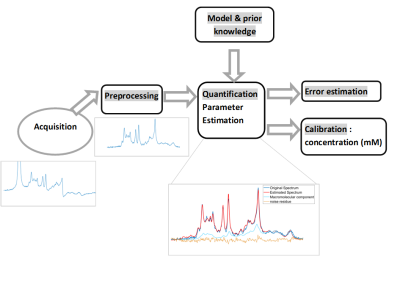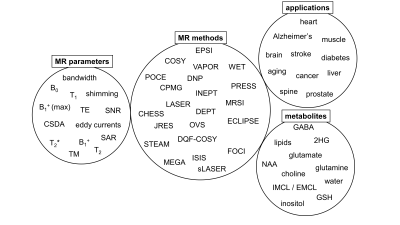Basic MR Spectroscopy
Basic MR Spectroscopy
Weekend Course
Weekend Course
ORGANIZERS: Roland Kreis, Malgorzata Marjanska, Wolfgang Bogner
Saturday, 11 May 2019
| Room 516C-E | 08:00 - 11:30 | Moderators: Erin MacMillan, Atiyah Yahya |
Skill Level: Basic to Intermediate
Session Number: WE-06
Overview
This course provides a comprehensive introduction into in vivo 1H MR spectroscopy and is intended for people entering into this field or interested in refreshing their knowledge. It reviews basic principles, pre-acquisition calibrations, state-of-the-art sequences and data analysis. It also provides information on how to judge spectral quality and choose appropriate sequence for specific MRS application.
Target Audience
MR scientists, MR technologists, clinicians, and neuroscientists interested in performing MR spectroscopy studies or developing related methodologies.
Educational Objectives
As a result of attending this course, participants should be able to:
- Recall the basic physical principles behind MR spectroscopy;
- Recognize state-of-the-art sequences;
- Judge quality of published MRS data;
- Describe the data analysis pipeline; and
- Choose appropriate sequence for the application of interest.
Overview
This course provides a comprehensive introduction into in vivo 1H MR spectroscopy and is intended for people entering into this field or interested in refreshing their knowledge. It reviews basic principles, pre-acquisition calibrations, state-of-the-art sequences and data analysis. It also provides information on how to judge spectral quality and choose appropriate sequence for specific MRS application.
Target Audience
MR scientists, MR technologists, clinicians, and neuroscientists interested in performing MR spectroscopy studies or developing related methodologies.
Educational Objectives
As a result of attending this course, participants should be able to:
- Recall the basic physical principles behind MR spectroscopy;
- Recognize state-of-the-art sequences;
- Judge quality of published MRS data;
- Describe the data analysis pipeline; and
- Choose appropriate sequence for the application of interest.
| 08:00 |
Basic Principles of MRS (Chemical Shift, J-Coupling, Relaxation & Field Strength Effects)
Lars Hanson
The lecture provides a basic understanding of the mechanisms essential to in vivo MR spectroscopy, i.e. those that influence the time and frequency representations of the MR signal in the absence of imaging gradients. Topics include nuclear interactions, the free induction decay (FID), data representations,and signal characteristics in the time and frequency domains. An effort will be made to give intuitive insight and fresh perspectives on the very basics, including interpretations of math frequently appearing in MRS literature.
|
|
| 08:30 |
Acquisition Methods for Full Profile & Specific Metabolites (STEAM, PRESS, LASER, CSI & MEGA-PRESS)
Assaf Tal
This lecture will cover some of the popular and/or recent MRS localization schemes, including PRESS, STEAM, semi-LASER, LASER, STRESS, MEGA-PRESS and SPECIAL. We will outline the reasons for preferring one module over another. In particular, we will pay special attention to the effect of different modules on coupled resonances - such as those of glutamate, glutamine, GABA, glutathione and lactate - and discuss advantages and disadvantages of each module in detecting each type of metabolite.
|
|
| 09:00 |
Pre-Acquisition Adjustments (B0 Shimming, B1 Shimming & Water Suppression)
Vincent Boer
In this lecture, the most common pre-scan adjustments for MRS and MRSI will be discussed, as well as the most recent and upcoming developments.
For MRS studies, the pre-scan adjustments are an important factor for achieving best quality and reproducability. Failing of even one of the adjustments can lead to severe loss in spectral quality.To perform a correct pre-scan adjustment, the user is required to monitor the different preparation steps before starting the actual experiment. Correct preparation of an MRS acquisition requires knowledge of the following steps:
|
|
| 09:30 |
Break & Meet the Teachers | |
| 10:00 |
 |
Data Processing, Fitting & Quantification
Hélène Ratiney
This lecture tackles the main steps and concepts underlying the quantitative analysis of MR spectroscopic signal in an in vivo context. The goal is to obtain reliable metabolite concentrations from its analysis.
|
| 10:30 |
 |
Matching MR Methods With Appropriate Applications
Robin de Graaf
This presentation will review the decision process to arrive at an optimal combination of MR sequence elements, such as spatial localization, water suppression and spectral editing. Examples of specific applications, metabolites and MR hardware limitations will be provided to demonstrate that an optimal choice for one condition may not necessarily be optimal for a different one. While guidelines and decision trees can help the user under most experimental conditions, an intimate knowledge of each specific MR method is required when straying off the beaten path.
|
| 11:00 |
Spectral Quality (How to Review Your Own & Judge Published Data)
Alexander Lin
|
|
| 11:30 |
Lunch & Meet the Teachers |
 Back to Program-at-a-Glance |
Back to Program-at-a-Glance |  Back to Top
Back to Top